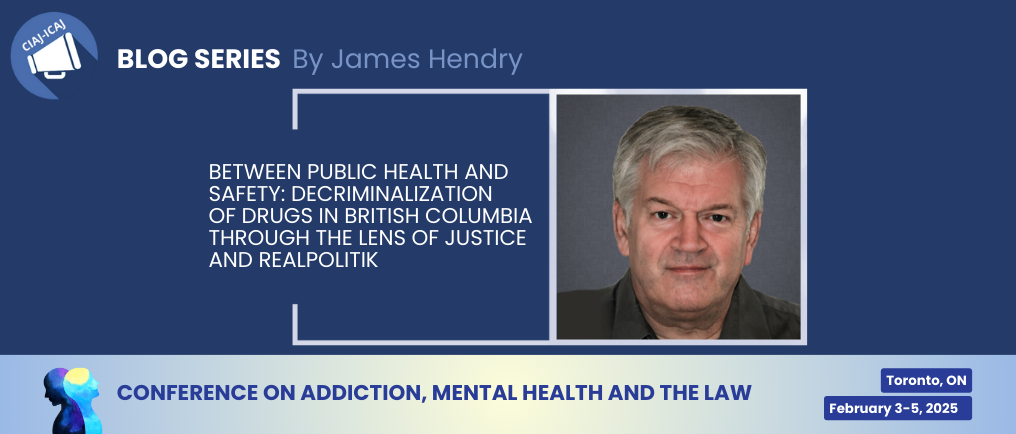Between Public Health and Safety: Decriminalization of Drugs in British Columbia Through the Lens of Justice and Realpolitik

Innovative treatment for drug addiction and realpolitik
BC declared a health care emergency in April 2016 because thousands of residents had died of increasingly toxic illicit drugs. The BC government studied the problem and solutions in great detail. A major Death Panel Report to the BC Coroner updated in 2022 examined the deaths. Studies recommended evidence-based steps to reduce deaths from overdose. BC improved treatment and harm reduction services. But a key element was decriminalization.
To further the healthcare rather than criminal approach, BC applied in 2021 for an Exemption from the Controlled Drug and Substances Act to decriminalize adult possession of small amounts of illicit drugs. BC chose the Exemption route to reduce the individual stigma from the criminalized approach. Experts found the stigma interfered with access to proper health care and led to riskier solitary consumption of higher toxicity drugs. BC’s application for the Exemption referred to a 2021 Angus Reid poll showing 66% of BC residents in favour of decriminalization, supported by the police, provincial health authorities, First Nations, and several municipalities.
The federal government granted the Exemption for three years commencing January 31, 2023. Initially it exempted adults for possession of amounts up to 2.5 grams of illicit drugs except near schools, childcare facilities, and airports.
In November, the BC legislature passed legislation whose purpose as stated by sponsoring Minister Farnsworth was balancing the benefits of decriminalization with public safety concerns about consumption of illicit substances near places with children and families in their neighbourhoods and recreational spaces, workplaces, a business or residential building that is adjacent to a public place such as a sidewalk or a public transit bus stop. The Act was to make provincewide standards for public drug use and create police power to direct users to better and safer places. It passed the Restricting Public Consumption of Illegal Substances Act prohibiting the consumption of illicit substances with regulatory limits on the use of exempted substances. For example, the Act empowered police to displace users before or after consuming an illicit substance, on pain of arrest or substance seizure, as an offence under the provincial offences act.
A group of frontline nurses obtained an injunction based on s. 7 of the Charter having obtained standing from potential psychological and physical risks caring for their clients and to advance the interests of their clients who might not be able to advocate for themselves. Because of the extraordinary power to suspend pending legislation, Hinkson CJ held the onus was on the claimants to show a valuable public purpose of an injunction to overcome the presumed public good of the Act.
Hinkson CJ held the claimants had satisfied the test for an injunction.
First, nurses brought evidence raising serious s. 7 security of the person questions because the Act created a “prescient risk” by pushing users and carers from public places and available health services.
Second, Hinkson CJ found irreparable harm largely from the Act’s allowing displacement of users from public places. Hinkson CJ was largely influenced by the expert evidence produced by the Death Review Panel to the Coroner based on a review of thousands of actual overdoses. He accepted the 2022 Death Review Panel Report that the criminal approach is “the primary driver” of the illegal, unregulated, toxic street supply resulting in increasing death rates and that stigmatizing illicit substance use by fear of criminal sanctions creates a barrier to the health services users need. Hinkson CJ noted Overdose Prevention Services and Safe Consumption Sites were safer but less available than they should be. Evidence showed interaction with police can lead to isolated and riskier drug use, undermine connecting with health services and that drug seizures can lead to increased resort to unsafe unregulated market. The Death Review Panel reported that a majority of deaths resulted from lone drug use away from support in the event of overdose. Evidence showed that taking substances in public reduced the likelihood of overdose and that displacement can override safety habits creating a sufficiently high probability of irreparable harm. Evidence showed care providers can be traumatized by the death of clients and experience risks to themselves from having to provide care in isolated places.
Third, the balance of convenience in the unique context of the health emergency met the high standard of public benefit necessary to suspending the coming into force of the Act. He recognized the social harms associated with open public use of illicit drugs, such as drug-related nuisance, criminal activity and other public safety concerns predicted by the BC Association of Chiefs of Police in qualifying their support of decriminalization. But Hinkson CJ observed all of these problems could be dealt with because BC could follow-up by legislating constitutional limits on behaviour.
The BCCA dismissed BC’s application for leave to appeal because any decision they came to would not facilitate the resolution of the action’s underlying issues nor the claimants’ anticipated application to extend the injunction.
In April 2024 BC announced that it seek an amendment to the Exemption to “recriminalize” public drug use by seeking an amendment to the Exemption because of political pressure resulting from anecdotes of problematic drug use in public, notably hospitals. Contemporaneously, the Deputy Chief of the Vancouver Police Department and President of the BC Association of Chiefs of Police testified before the House of Commons Standing Committee on Health stating police supported decriminalization but that these anecdotes showed a need for a comprehensive strategy that included the protection of the broader public.
In May 2024, the federal government modified the Exemption permitting possession at designated health clinics, places where unhoused persons are lawfully sheltering, or in private residences. BC announced that police training on the twin goals of destigmatizing drug use and protecting the public this measure will enable them to properly exercise their discretion to offer health information to users, compel their displacement, seize their drugs or arrest them.
Developing evidence-based policy is incredibly hard. BC tried to solve a serious health problem by evidence-based, innovative steps. Legislated controls were suspended by an evidence-based court decision. BC’s political response was to increase police discretion informed by the twin goals of destigmatizing users and public safety. However, the courts have rarely accepted the discretion of officials as a substitute for legal constraint. Though the BCCA said that Hinkson CJ did not make any findings of fact prejudicing BC’s position on the merits, the likely result of the finding of irreparable harm will be more litigation. Somewhere in the midst of the difficult human context of drug usage and its public consequences, politics, policy and constitutionality will have to meet.


